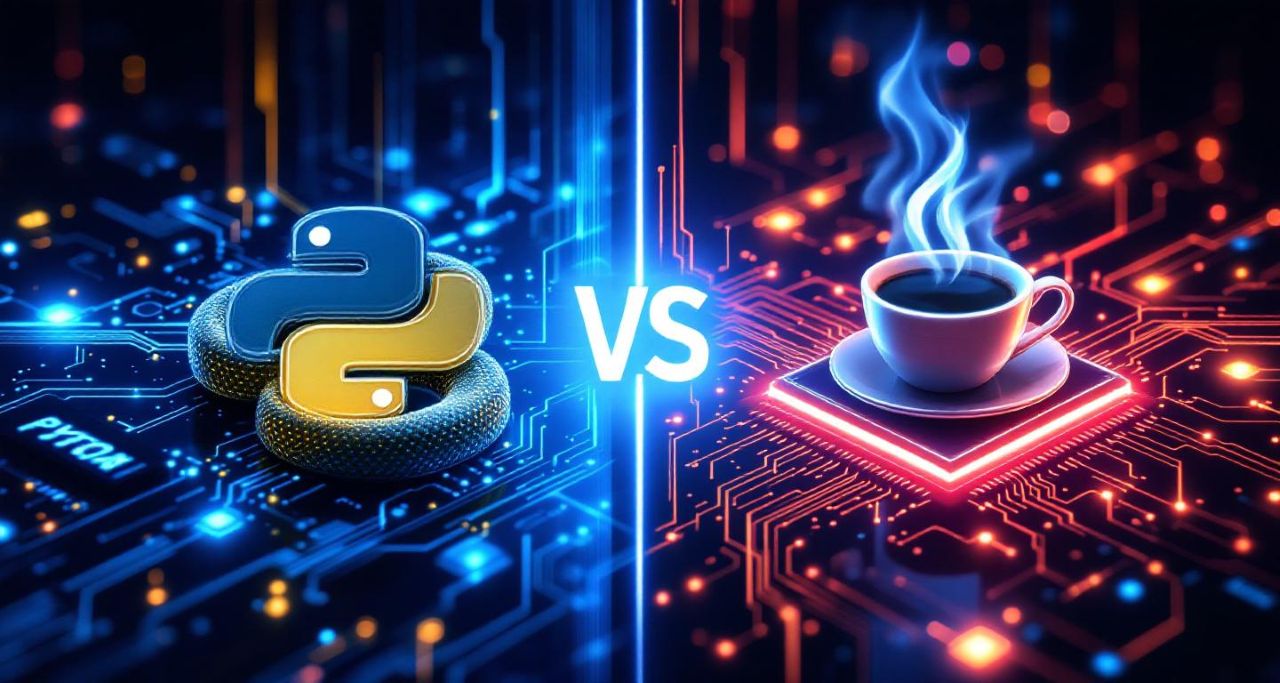
Python and Java are two of the most powerful and old programming languages that are still popular all around the world for creating robust software and apps.
From websites and mobile apps to AI tools and enterprise systems, you can create anything with the help of these languages. But, when it comes to choosing between the two, so many developers and businesses get confused about which one they should choose.
This blog digs deep into Python vs. Java for software development so that you can easily make your final decision.
Popularity in 2025
In the last few years, Python has become a bit more popular than Java. If you check Google Trends since 2019, the Python searches have grown faster. On the Stack Overflow platform, around 51% of developers use Python as compared to 30.3% for Java and GitHub also reports more Python projects than Java.
But Java is still a popular choice in the world of enterprise software due to its strong performance and secure backend systems, which keep it relevant in banking, Android apps, and large enterprise systems.
So, both are going strong but for popularity, Python wins.
Syntax and Ease of Use
When it comes to simplicity of syntax and clean coding, Python is quite a famous name. It is because it reads almost like English and does not require curly braces or semicolons. You can do a lot in just a few lines of writing code which makes it quite perfect for beginners who want to quickly start the project.
Whereas Java follows a strict structure as you have to write more lines and be clear about data types you are defining. While this takes more time, it also makes your code strong in a technical manner and less prone to errors in the long run. It is the most used language by every top Android application development company.
So, while choosing Python vs. Java for software development, Python is easier to start and Java has complex but better long-term systems.
Performance and Speed
Java is fast as compared to Python in most of the use cases because it compiles bytecode and runs on the Java Virtual Machine. This architecture is great for large-scale apps and real-time systems. If you are building a banking platform or a multi-user Android app, then Java is the way to go.
Python is slower because it is interpreted line by line; still, it is fast enough for data analysis, automation, web scraping, and small web apps. Not only this, but you also receive updates in Python quicker than before.
Learning Curve
For anyone who is new to programming and wants to understand the basics fast, Python is the way to go due to its simple syntax.
Java has a steeper learning curve meaning that its syllabus is vast before you can actually build anything. You have to be good with concepts like object oriented programming, classes, interfaces, and many other things. But yes, if you master it, you will be able to handle complex systems easily.
That is why many universities teach Java to help students create a solid programming foundation, while bootcamps and online courses often go with Python for faster results.
Libraries and Tools
Now this can be a key part for anyone looking for Python vs. Java in 2025 with the libraries and tools. Although it is not possible to list down all the libraries and tools because they are massive, we will cover the most popular ones.
When it comes to Python, there are large collections of libraries for data science, machine learning, AI automation, and web development. For example:
- TensorFlow and PyTorch for AI and ML
- Flask and Django for web apps
- Pandas and Matplotlib for Data Analysis
- BeautifulSoup, Selenium for Web Scraping
Java is strong when it comes to backend, Android apps, and creating enterprise-level secure systems. It has:
- Spring and Hibernate for backend frameworks
- JDBC for connecting to databases
- Maven and Gradle are build tools.
- Deeplearning4j, Weka for AI, and ML libraries
If you are working with machine learning or automation, Python might be the best option. But if your project requires speed, security, and scalability, Java wins here.
Final words
There is no one answer to this comparison because both Python and Java have their own areas where they shine. Now it depends upon your business requirements as to what is more important to you.
If you want an easy and quick language that can be perfect for new tech like AI and data analysis, Python should be your choice. If you want a secure, faster, and enterprise-level app, then Java is still a winner, no doubt.
But the thing is, in the end, neither can make you go wrong if you have the right software development company with you.
